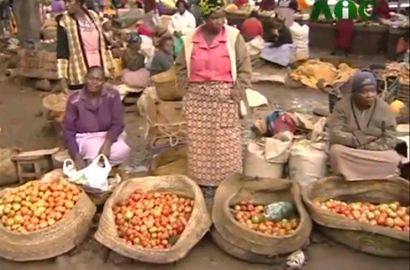By Omondi Julius Odera, Kampala, Uganda
In a bid to curb the overwhelmed number of agricultural extension officers in Kenya, the ministry of agriculture is embracing technology with their introduction of E-Extension services, which are aimed at reaching out to over 7 million farmers annually as opposed to the conventional one on one service that impacted on less than 2 million farmers.
With the country estimated to be having only about 5000 extension officers, it was technically impossible to have an impact in the country given that the Kenya’s economy is mainly agro based with a huge chunk of the population engaged in agriculture. “With 80 percent of the country’s population engrossed in agriculture, we aim to reach over 7 million farmers annually with our integrated information and communication technology (I.C.T) approach that brings in a total shift from the traditional extension service delivery that was time consuming and reached a few farmers,” explained Wanjohi James assistant director in the E-extension department in the ministry of agriculture.
The proponents of the new approach are leveraging on the advances that have been gained in the ICT sector in the country to help empower more farmers. The mobile phone and internet penetration that stands at 77.2 percent and 63 percent respectively is what the E-extension programme is hinged on. It is estimated that over 20 million Kenyans access internet and there are over 30 million mobile phone users in the country figures that can help in succeeding the E-extension service because some of these internet and mobile phone users are farmers.
The E-Extension programme, which was launched late last year, is designed to help foster food security through adoption of smart modes of mass communication to reach to the farmers. The project has seen over 654 E-Extension agents trained and equipped with the necessary technological gadgets. The agents are positioned at the ward level and 5000 agents more are expected to be enrolled through the inclusion of the County governments into the programme. “We are equipping our E-Extension agents with a laptop and a smart phone to help them empower the farmers in the field. While in the field, the agents reach out to farmers through a combined approach which can be through mobile, video trainings, WhatsApp messaging tools among others. The aim is to have as much impact as possible in order to uplift our farmers and that is why we are encouraging all these combined approaches.”
The diverse needs of farmers in the country have also contributed greatly to the introduction of the E-Extension project. Kenya has farmers who are not dealing in uniform crops and therefore require diverse information depending on the crop or animal one if rearing. Initially the farmers expected the extension officers to be jack of all trades a fact that was not possible. As a result the ministry has introduced farmers agricultural websites that have tailored made information on specific needs of the farmers ranging from market information, Pests, seeds, among others. Using this information from the online sites, the extension agents are expected to revolutionize agriculture in the country. Some of the leading partnership websites that the E-extension agents are using to educate the masses include www.nafis.go.ke, www.kenyaseed.com, www.ikilimo.org, www.infonet-biovision.org among others. “The sites are now helping the extension officers empower farmers with write ups and instructions from them. They also give the farmers skills to find the information and answers they need and facilitate their networking locally, regionally and even at a global stage,” noted Wanjohi.
There are other programmes under the project which include E-clinic forums and text and video messaging to exchange information between the farmers and the agents. Kariri Wangeci an E-extension officer serving farmers around Limuru explained that with most farmers having the now affordable smart phones, E-clinic programs have been very successful. “We have specific days outlined for visits to different markets where farmers come with their inquiries either on video on the phones or physically bring the affected crops.” She acknowledges that through these forums, she has been able to offer practical solutions to many farmers and at the same impact positively on their farming ventures.
“Some of the farmers even send me inquiries through WhatsApp messaging thus saving the cost for farm visits and helping educate more farmers. For instance, when I send out a remedy for a specific disease, the farmers can share the information at the grass root level and help disseminate it to masses through the multiplier effect,” explained Wangeci.
According to Wanjohi, the deepening of ICT is a blessing and will help transform agriculture in the country with their new integrated approaches to extension services. “We believe that E-extension will help in transformation of extension service into pluralistic, demand driven decentralized value chain and market driven by giving farmers information needs localized and customized which is adapted to local users.” Similar E-extension services have also been adopted in Uganda with National agricultural advisory service (NAADS) introduction of national farmers free call center service. The farmers get access to the call centre by calling 0800230100 which is toll-free.
